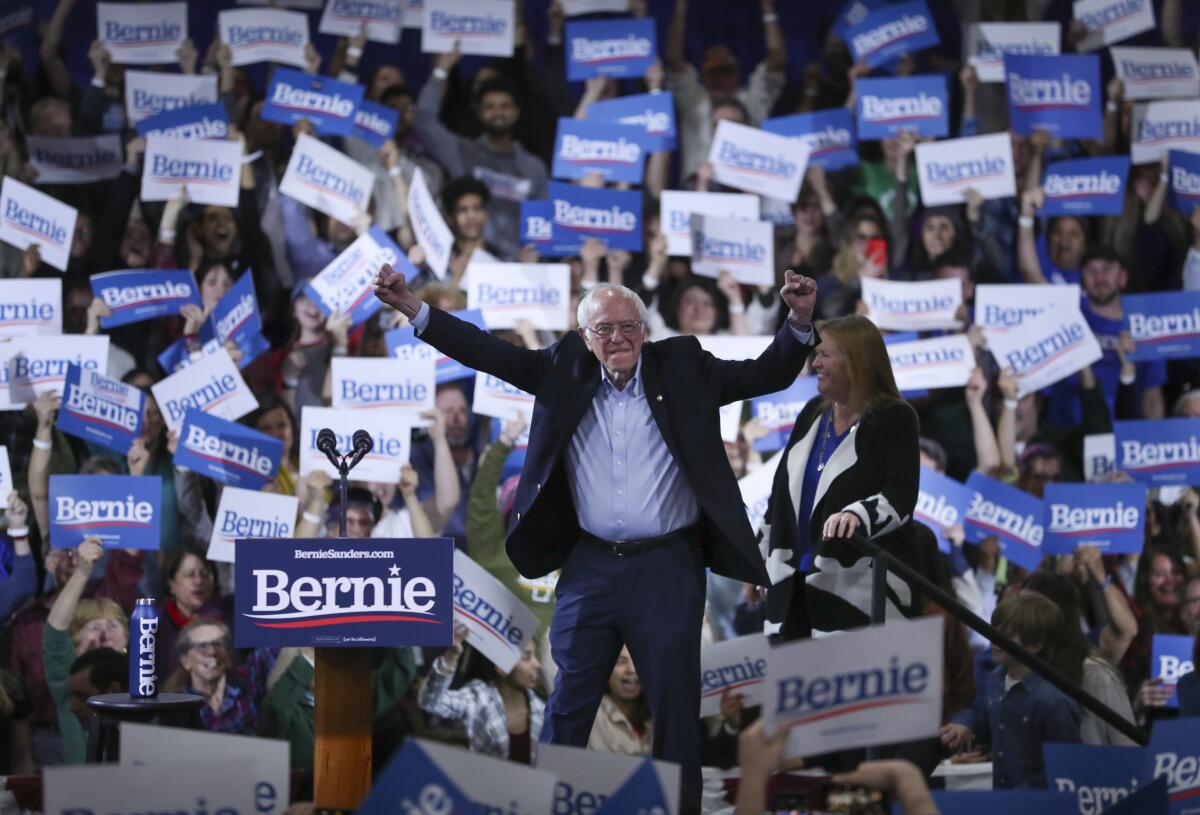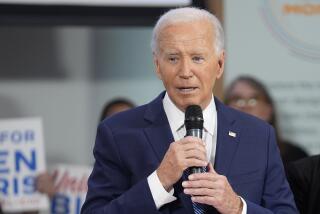Column: Where did Bernie’s revolution go wrong?

- Share via
Bernie Sanders still has at least a mathematical chance to overtake Joe Biden in the race for the Democratic presidential nomination.
But to pull that off, Sanders probably needs to make dramatic changes to a campaign that ran into a brick wall on March 3, when he lost 10 of 14 states and the lead in delegates. He’ll get a chance on Tuesday, when six more states vote.
Super Tuesday exposed Sanders’ biggest problem, especially now that he’s in a two-man race: He has failed to expand his support much beyond the progressives he came with.
The Vermont senator says he leads a “multi-generational, multiracial movement” and argues that he is the strongest candidate Democrats can field to beat President Trump in November. But last week’s results knocked a gaping hole in that argument.
His claim that he could mobilize an army of new, young voters imploded. While he drew the most voters under 30, they did not turn out in the numbers he needed. In six of the 12 states that have held primaries, turnout among young voters actually declined from 2012.
Sanders concedes that he hasn’t found a remedy.
“I will be honest with you, we have not done as well with bringing young people into the process,” he said after the vote. “It is not easy.”
As for Sanders’ claims of a multiracial coalition, he drew strong support from Latinos in Colorado and California, both of which he won, but not enough in Texas, which he lost. African Americans overwhelmingly backed Biden in state after state.
Sanders has long vowed to build a mass movement that will launch a “political revolution.” So far, his movement isn’t big enough to ensure him the nomination, let alone the drastic changes in the U.S. economy and social structure that he seeks.
That’s because what makes Sanders successful as an insurgent leader makes it hard — maybe impossible — for him to build a majority among Democrats.
He’s fiery, blunt and uncompromising. He almost never changes his mind and rarely softens his positions. He still gives the same speeches, more or less, that he gave more than 30 years ago as mayor of Burlington, Vt.
That makes his die-hard progressive supporters love him. But it gets in the way of bringing in liberal and centrist Democrats who may admire his goals but aren’t ready for a revolution.
Take the highest-profile policy argument in the Democratic race, the debate over how to achieve universal healthcare.
Sanders has proposed “Medicare for all,” a federally run health insurance plan that would be more generous and cost more than similar systems in Canada or Britain — and would abolish private health insurance.
Most of his rivals endorsed the basic idea but looked for ways to soften its impact, from a long phase-in period to opt-outs for people who want to keep their private insurance. Biden proposes a gradual expansion of the insurance plans introduced by President Obama, plus a new government-run plan for consumers who want it.
Sanders denounced such alternatives as half-measures that would leave millions of people uninsured.
Or take tax increases on the wealthy. Sanders would set the top individual income tax rate at 52%, while Biden proposes a 39.6% top rate.
More important to most voters, Sanders wants to raise taxes on middle-class Americans to pay for Medicare for all, but he won’t say how much — beyond claiming most families won’t be worse off.
“He needed to reassure working people that he wasn’t going to raise taxes when they can’t afford it,” Democratic strategist Tad Devine, who worked for Sanders in 2016 but not this year, told me. “I don’t think he’s done that very effectively.”
In 2016, Sanders railed against what he claimed was a rigged system as he lost the Democratic nomination to Hillary Clinton. Now that he could lose again, he has lashed out at the “Democratic establishment” for trying to block him from the nomination.
He’s right about that. Many Democrats are convinced he would lose to Trump, a key reason they ultimately rallied around Biden. But Sanders portrays their old-fashioned politicking as a nefarious plot.
He often sounds like the leader of a sectarian rebellion, not a consensus candidate who could unify a diverse political party.
Biden instead claimed the mantle of unifier and declared himself a “lifelong Democrat, a proud Democrat,” a not-very-subtle dig at Sanders, who declared himself a Democrat only to run for president.
Even Devine says Sanders should have joined the Democratic Party long ago. “If you aspire to lead a political party, it’s better to be a member of it,” he told me.
After his disappointing night last week, Sanders stepped up his attacks on Biden, slamming the former vice president for accepting Wall Street contributions, for voting to authorize the 2003 war in Iraq, and for suggesting cuts in Social Security in the 1990s. Biden quickly tweeted back that only Trump would cut Social Security.
None of those arguments will matter if Democrats have concluded that Biden, however imperfect, is more likely to beat Trump.
When Sanders appeared on MSNBC last week, Rachel Maddow asked a blunt question: Why does your campaign appear to be failing?
He didn’t give a direct answer. Instead, he retreated into his identity as an outsider, as the leader of a revolutionary movement.
“We’re trying to transform this country, not win an election, not just beat Trump,” he said. “The real question is: How [have] we come this far, taking on the corporate establishment?
“We’re doing quite well within our context,” he said.
If that means his lifelong quest to push the Democratic Party to the left, he’s succeeded. But it’s no way to win the nomination.
More to Read
Get the L.A. Times Politics newsletter
Deeply reported insights into legislation, politics and policy from Sacramento, Washington and beyond. In your inbox three times per week.
You may occasionally receive promotional content from the Los Angeles Times.











